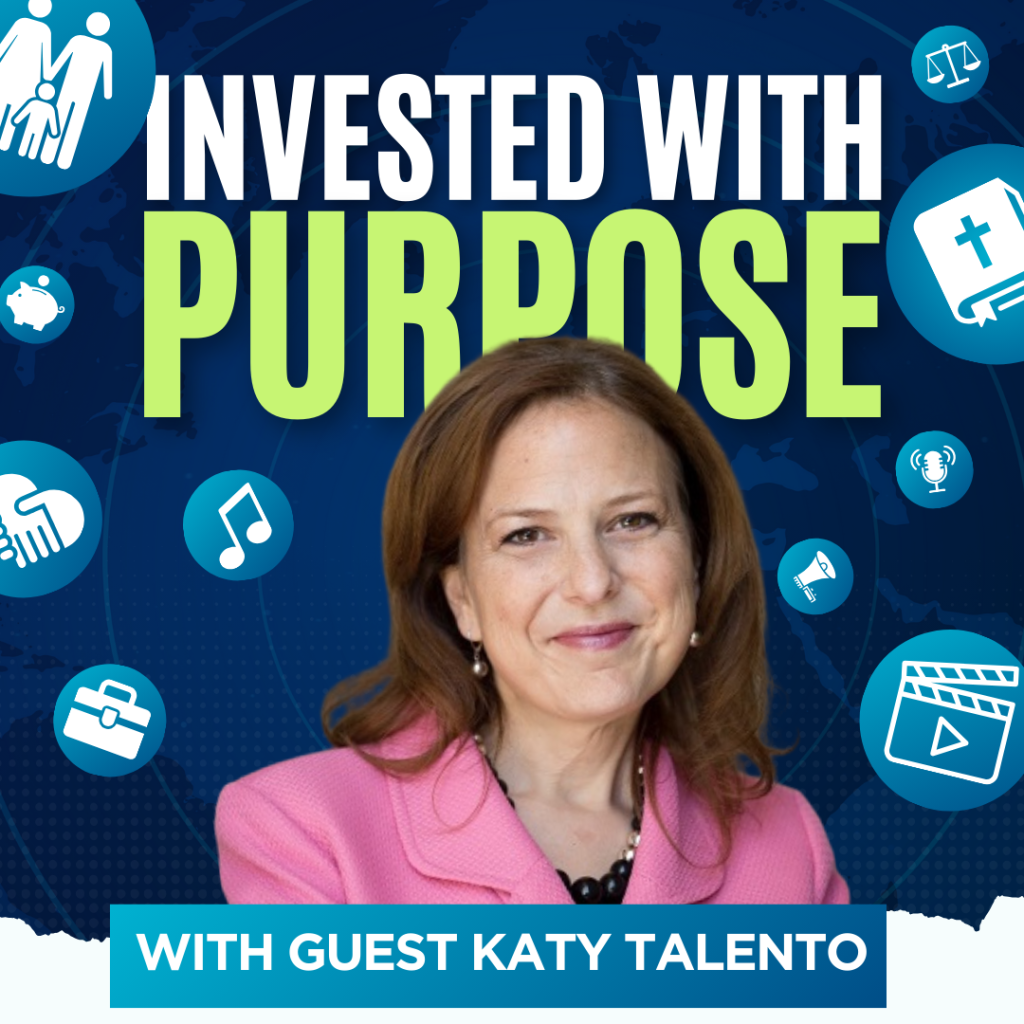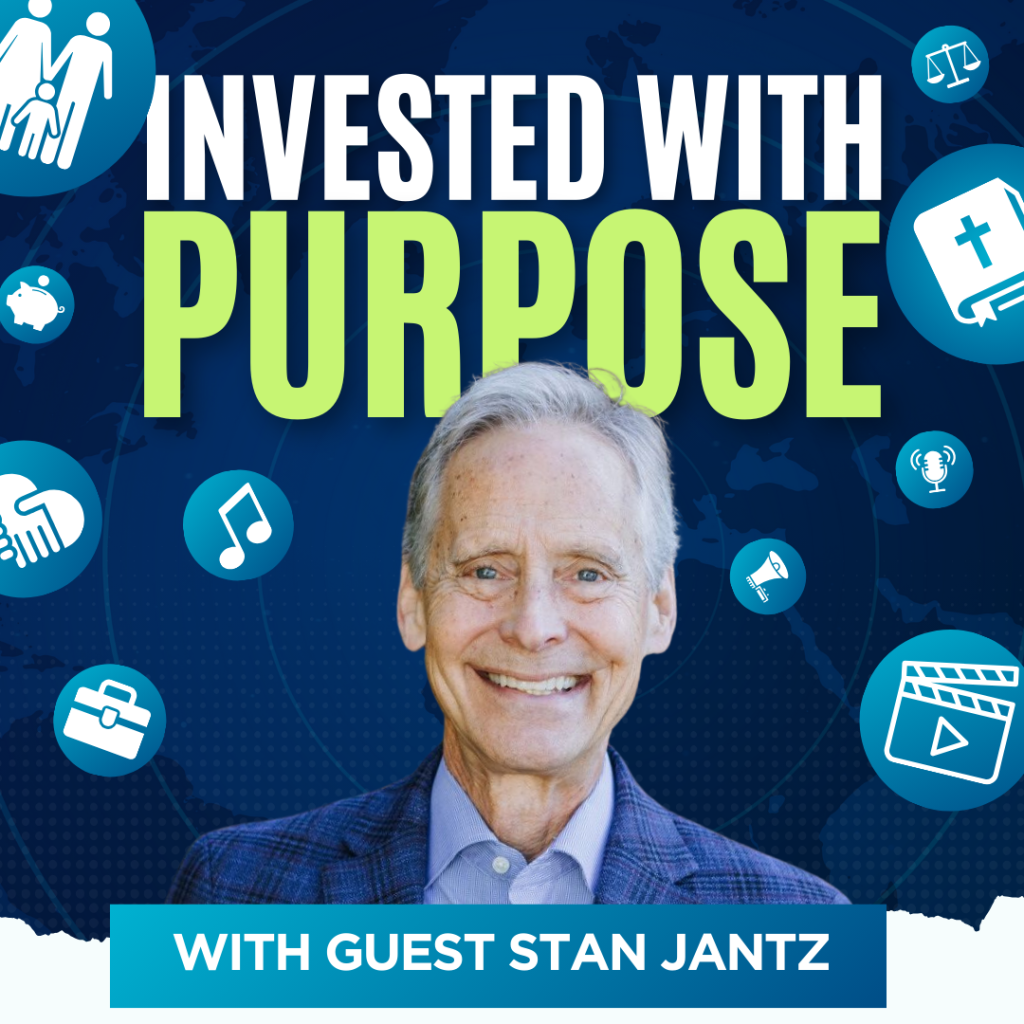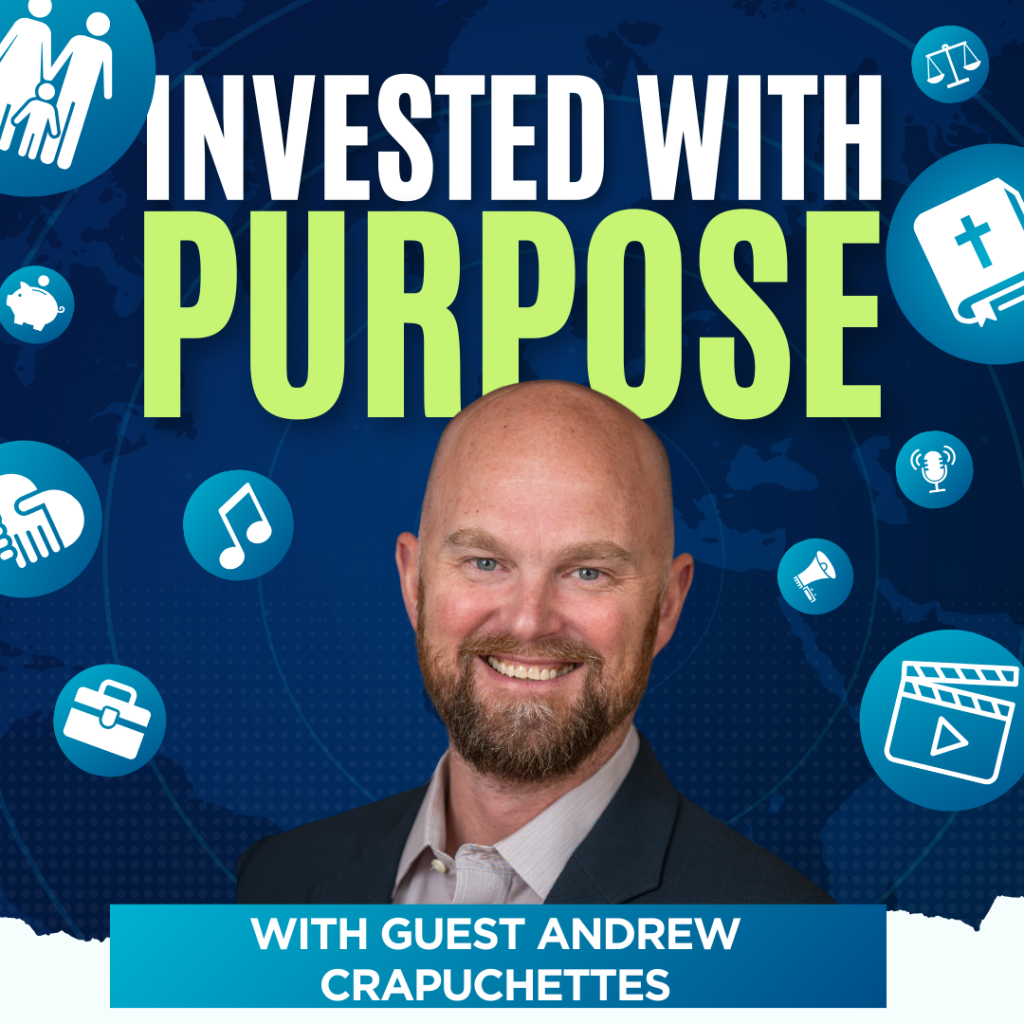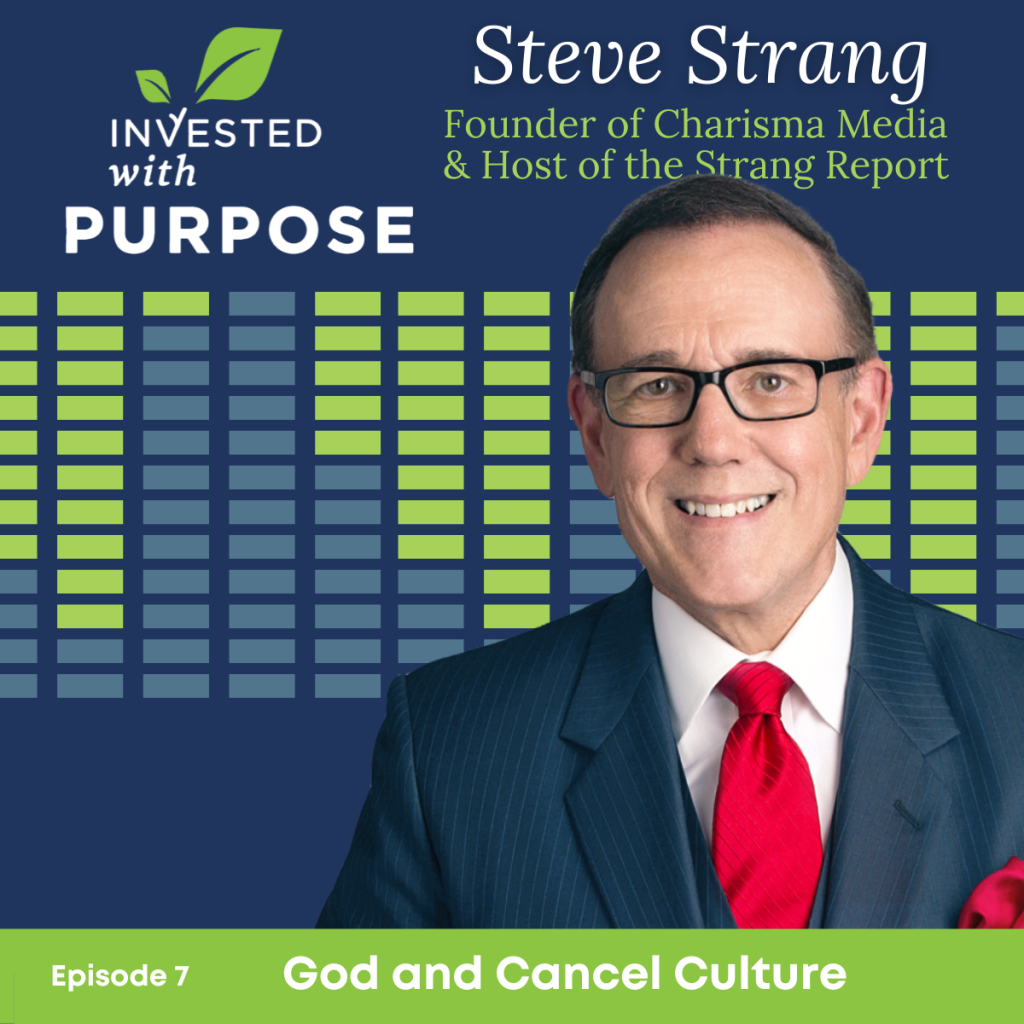















Orlando:
Grace and peace you’re listening to Invested with Purpose, making the most out of our time, talent, and treasure. My name is Orlando Aska.
Brian:
And I’m Brian Mumbert.
Orlando:
And today we have a very special guest with us.
Brian:
Yes, today in studio we have with us Steve Strang of Charisma Media, and I’d love to introduce him for you. Steve Strang is the founder of Charisma Magazine and an award-winning journalist, entrepreneur, businessman and author. He’s the founder and CEO of Charisma Media, and in 2005 was named by Time Magazine as one of the 25 most influential evangelicals in America. So thank you Steve for joining us.
Steve:
Well, I appreciate the opportunity.
Brian:
And Steve, I wanted to talk with you a little bit. You’ve been a staple of the Orlando community for a long time. When did you start Charisma Magazine?
Steve:
Well, I moved here to work for the Orlando Sentinel. I’m almost ashamed to say that now, it’s become such a rag.
Brian:
Well, back then it was probably more of a reputable newspaper.
Steve:
It was pretty powerful newspaper. I expected that I would live in Orlando for a year and move on to something better. That was what I was thinking. But my wife and I got real involved in a church and also the journalism profession was starting to go to the dogs back then. The Sentinel was anything but objective and the kind of wokeness that we see now had at least had its seeds. And I just decided, even though I had trained to be a secular journalist and had a measure of success at a young age, I decided I did not want to spend my life clawing my way to the top. And at the same time, in that, I think it’s fair to say that I was an on fire Christian, and I wanted to do something for the Lord, but I wasn’t a preacher, I’m not a theologian, so I had an idea and I went to the leaders of my church and persuaded them to let me publish a church magazine. That church magazine was called Charisma.
Brian:
Wow.
Steve:
And I actually did it as a side job while I worked at The Sentinel. As a believer in Jesus, I believe that God has a plan and purpose for humanity. It’s spelled out in the Bible. I believe the only way to live is to serve Christ and by the power of the Holy Spirit. And so that’s what I’ve designed, that’s what I’ve devoted my life to. Yes, I’m a businessman, I’m a publisher, but I didn’t do it because, oh, there’s a market there. I think I can make a lot of money and sell the company or do whatever normally people do. Ours is really a ministry, but because of the nature of publishing, we’re organized as a business.
But that’s also given me a lot of freedom because nonprofit ministries are hindered when it comes to speaking out about certain issues. I’m not hindered at all. I believe, listen, I believe in the free press, the First Amendment, which is also freedom of religion. And I think that the free press has a place in our culture. I believe it’s done a lot of good. It doesn’t seem to be so free anymore. It seems to be a mouthpiece for the left. But so in a way, we’re being counterculture. And I’ve spent my life doing this and it’s been a lot of fun. I enjoy going to work every day and I’ve been able to travel the world and interview a lot of interesting people. When it came time to interview Donald Trump, guess who is the journalist who interviewed him? I was. And I’ve gotten into a lot of meetings because they figure that I represent a certain segment of the Christian community and there’s nothing wrong with that.
Orlando:
We have the challenge sometimes, or not the challenge, but the question of where to draw the line. And so my question is, as far as Christian media is concerned and wanting to communicate, regardless of denominations standing together in Christ and believing the essentials, it has to be, I would assume that there would be challenges in regard to keeping foundational truths amidst so many that maybe go too far in a certain direction, but wanting to keep the peace. Where do you draw the, or how do you utilize wisdom in regard to that from so many different perspectives, I’m sure that there could be some things that may be cause for concern, so how do you deal with communicating that but saying we’re all here for the same purpose but yeah, in regard to Timothy or from our perspective here, we see that from maybe some of the screens that we have. So we draw the lines in certain places, but others may not. How do you see that conversation?
Steve:
That’s where the Holy Spirit comes in to give us wisdom. Read the book of Proverbs. In his day, he was dealing with a lot of the same questions, and none of us are going to get it right, we certainly don’t. But, A, you try, B, you do the very best you can, and C, you change if you have to. And I have opportunity to be on television and different interviews and I always try to encourage people that if God can use me, because I was not trained as a businessman, I don’t come from a money background, I wasn’t even trained in business, but I had a dream, I had a purpose and I believed God. The Bible says without faith, it’s impossible to believe God. And there are a lot of things that you can just pray and believe and can see come to pass if we have a vision and have faith.
Brian:
There’s definitely some similarities to Art starting Timothy Plan and having this dream, this vision that he had and the goal to see it through. And what you’re describing with charisma as well, how did you get distribution? I mean, so you started it in church, a local church here in Orlando. That church is still here, I know Calvary Assembly, but how did you get it from church level to nation level?
Steve:
Well, first of all, let me comment on Art Alley, who I have a lot of respect for and I knew him back when he was starting and he also met a need. He met a need that other people didn’t meet. He was in the right place at the right time. He also is enormously skilled. He’s been able to attract a very high caliber of staff in my opinion because just over the years we’ve had a lot of interaction and I think he’s a real great success story. In terms of distribution, we did start at a large church. The first subscribers, we started with 400 subscribers. They were all church members. We charged $3 a year, if you can imagine, the magazine was 50 cents. We charged $300 a page for advertising. How in the world can I remember that? I can’t even remember what I had for lunch yesterday, but I guess those things stick in your mind.
And our expenses were pretty low and a lot of it was word of mouth. And also back in the day, there were these Jesus festivals and we did a booth and people would sign up. A couple ministries got behind us, and we were kind of the new kid on the block, and a lot of the magazines back in the day, and there were quite a few, were kind of stuffy and predictable and we were writing about the new Messianic movement, I remember, and about Jesus music. That’s what we used to call it. When I started, it was controversial to have a drum set inside the church. Most churches had an organ and a piano.
Brian:
I was in one of those churches.
Steve:
And once in a while, a guitar, an acoustic guitar, and that was it. And so we would write about these kinds of things. Listen, and that’s part of what we try to do at Charisma Media is we try to cover what’s going on. So Mario Murillo, who hardly anybody has heard of, is having these great tent revivals and people are coming from all over the country. I’ve been to some of his meetings and there’s a lot of examples of that. Does it get any media play? But let me give it a little disclaimer before we go on. Back in the fifties and sixties, bookstores would not carry Christian books except for a handful like maybe Norman Vincent Peale.
TV had almost no Christian content at all except maybe on Sunday morning. All that’s kind of gone away. The whole national religious broadcasters and the whole Christian book selling industry was counter culture and that was in a day that now we think of in very nice terms. But what is different now is that good is called evil. So trying to raise your kids with traditional values in a traditional home with a husband and wife, you’re considered some kind of bigot. I read recently that people were insulted by the terms husband and wife because that wasn’t their lifestyle.
Orlando:
Prior, me and Brian were talking about how media has changed so much and how you were an innovator in the space of getting the word out, and you talked about some of that briefly. Just would love to hear your thoughts on how you think, I guess, the culture and media in general seems to be catching up to that way of taking ownership into what the narrative is. And another point that you made that I appreciated was of how doing things, the way that God has ordained them is countercultural, being a husband and wife and the family unit being something that’s frowned upon. It’s just really interesting how things have been kind of flipped on their head and we’re made to seem like the crazy ones for wanting to do things the way that God has said. So that was just a thought that I appreciated.
Steve:
Well, if you stand back, there are people that want to do, the Bible talked about people wanted to do what was right in their own eyes. It’s like any kind of evil was okay, is okay that you can take any kind of drug, have any kind of intimacy with anyone at any time, in any way, in any place. I don’t want to be too graphic, and what’s stopping that? What? It is the values that ultimately come from the word of God. Even people who believe those values who maybe do not go to church or do not serve Jesus in the way that we would encourage people to do is from that basis, right? So they have to get rid of that. They have to get rid of it. It’s just like when communism takes over, they have to get rid of whatever democracy there might be in the culture.
Either you’re in for the gospel and trying to serve Jesus as best you can or you’re not even trying and you’re going over to the other side. And in a way that’s good because people are getting more and more desperate that people know, even people who never go to church, even some atheists know that there’s something wrong with the fabric of our country. – Steve Strang CEO of Charisma Media
And Nazism was pretty bad, we tend to forget that. And there have been some, communism, how many millions, the Communists have killed many more than Hitler ever, Hitler was only in power for 20 years or so. The Lord is, I believe the Lord is raising up a standard. I believe that, for years the whole Christian community has been going along to get along. I mean you can go all the way back to the Middle Ages and track through history, but the Lord always raises up a standard. I think that hypocrisy is going away. Either you’re in for the gospel and trying to serve Jesus as best you can or you’re not even trying and you’re going over to the other side.
And in a way that’s good because people are getting more and more desperate that people know, even people who never go to church, even some atheists know that there’s something wrong with the fabric of our country. It’s going in the wrong direction. And as a result, people are turning to Jesus. The media won’t acknowledge it. They make it, they make it sound, they play up all the time that church attendance is down. Some of the church attendance is down from what I said, you don’t need to go to church on Sunday morning to make people think you’re a good person. If you don’t feel like going to church, you just stay home. But do they cover that the Assemblies of God has grown 17 years in a row?
Brian:
I did not know that.
Steve:
I mean that is bucking the trend. And there are some other churches that are growing as well, and part of it is that they focus on the bad. They don’t focus on the good. They even try to make Christians think, oh, there’s this scandal and that scandal. There are too many scandals. But guess what? There were scandals in the early church. The Apostle Paul dealt with it in the book of Corinthians. What they were doing was pretty gross. And God has always used imperfect people. I mean, I’m reading through the Bible and reading about Abraham and Isaac this morning, and guess what? Both of them did some pretty naughty things, but God has always used imperfect people.
Brian:
Nostalgia is one heck of a thing. You always romanticize the past. You remember it better than it was because you want to remember the good and you block out the bad.
Steve:
Or we look at it from our perspective. And someone said that life is like a passing parade. Some people are seeing the trombone at the beginning of the parade and other people are seeing the middle of the parade and other people are seeing the elephants, and the pooper scooper at the end. Some Christians are like teenage boys that have suddenly, their hormones are developing, and they think the whole world is interested in that. And no, it’s just that they become interested in that. And so we see things from our own perspective so much that we can’t see the big picture, but God is in control. I’ve read the back of the book and we win. And even if the horrible things in the Book of Revelation come true, and we believe they do, and they’re pretty bad if they do, and it almost feels like we’re rushing headlong into that, that’s still good because it’s part of God’s plan, which the Book of Revelation says a lot of people are going to die.
What do we, as believers, what do we do? We end up in the presence of Jesus. The faster we get through these really bad times, the quicker we get to the millennial reign of Christ. And so I don’t know if that encourages anyone else, but I encourage myself by thinking that way. Now, do I want to live through that? I don’t think so and I doubt you do either. We all want to live a good and peaceful life. The Bible tells us to pray that way. There have been, listen, the Apostle Paul thought that Jesus was going to return in his day, and how many people have thought that Jesus was going to come? The Seventh-day Adventist denomination started because their leader said that Jesus was going to come in 1844.
Brian:
My parents had a book in our house, 88 Reasons Why Christ Will Return in 1988.
Steve:
Listen, I can remember 1988, I remember that hubbub. The fact is that the Bible says no man knows the date or the hour, not even the son of man himself. Sometimes I feel like on one hand it’s this and on the other hand it’s that, but life is complicated and when we think we figured it out, we really haven’t. Wisdom is sort of being able to take all this information and understand it, and I believe that we have to understand it through the power of the Holy Spirit. That’s why I wrote my book, Spirit-Led Living in an Upside-Down World.
Brian:
Well, there’s a lot of parallels to what you were saying earlier about going along to get along versus now you’re seeing you’re either in or you’re out on the whole Christianity thing. And being in the biblically responsible investment world, it’s becoming that too, where you’re seeing companies that are making these audacious stands that are completely counter-cultural to Christianity and is forcing people into like a, do I want to be a part of this? Do I even want to shop there? Do I want to invest there? Do I want to be a part of this? It’s really clarifying, I guess a lot of things in our industry, which is kind of like a symptom of what’s going on in the culture right now. It’s just, yeah, you’re in or you’re out.
Steve:
When I was a kid, it was wrong to have a television. They said it was like, there was some people, they were kind of fanatics, but they said it’s like bringing a toilet into your living room. Well, guess what? They were right. I think that in the same way that there’s a separation, I think there’s been a separation even in the church on all these things that really aren’t that important. Because really what’s important is that you love Jesus, that your heart is pure, that you don’t have a fence, that there’s not private sin in your life, rather than you do a bunch of do’s and don’ts. Because some of those people who follow those do’s and don’ts, they were some of the meanest…
Brian:
They’re not even Christians.
Steve:
They were some of the meanest people you ever saw and they were condemning and really it hurt the cause of Christ. We can’t afford to do that anymore. I hate to get on a negative note, but I mean there were times when Christians would argue and not even cooperate because they had a different view of baptism or their view of communion was different and they would argue and kind of shun each other. We don’t have time for that anymore. If you believe that the Bible is true, that God created the world, that Jesus came to redeem mankind, I mean, we have to work together. And so in a way, all this persecution, persecution has always purified the church and I believe that that’s happening.
Brian:
So a while back when you were talking, you mentioned you interviewed Donald Trump. And reading through your bio, he’s not the only president you’ve interviewed, you’ve interviewed four presidents and we were talking before the start of the show, so that was two Bushes and Trump and Obama, correct?
Steve:
That’s right.
Brian:
So one of those things is not like the other. How did you end up interviewing Obama?
Steve:
Well, when Obama won the nomination in around May of that year when it was at ’08, he invited about 50 evangelical leaders. They were trying to get the evangelical community behind him, and most of them were kind of liberal denominations. I don’t want to say any names, but there was also Franklin Graham, TD Jakes was there, I sat next to Max Lucado.
Brian:
I think Joel Hunter from Northland was maybe part of [inaudible 00:21:03]
Steve:
Joel Hunter and I went up on the same plane.
Brian:
Oh yeah?
Steve:
I showed up at the airport, it’s like, oh, why are you flying to Washington?
Brian:
Funny you should ask.
Steve:
And so we kind of hung out. I’ve been friends with Joel for a long, long time, and he became friends with Obama and good for him. There were only two or three conservative, really conservative people in the room. So Obama was not president when I interviewed him, but we sat around a table and it was kind like a news conference setting. Everyone in the room did not ask a question because I’m used to that kind of setting. I spoke up and actually asked the first question, and I asked him, I said, the constituency that I serve is almost entirely pro-life, and I elaborate a little bit more, I said, what do I tell my constituency about your stand on abortion? So I asked him the only difficult question of the day. I tried to do it in a respectful way and I had read his book or one of his books in which he had dealt with the thing, and he said pretty much what he said in the book, that abortion is never preferred and we need to try to stop unwanted pregnancies, which I agree with.
Brian:
Absolutely.
Steve:
And you know what? In that sort of Christian setting, he tried to make us feel that his view is harmless, I don’t know if I’m telling you right. Now with the Bushes, I had a mentor named Doug [inaudible 00:22:39] who died about a year ago, and through a whole series of things, he ended up working at the White House. And so I was around George H. W. Bush when he was vice president and when he was running for president and I was able to go to the White House several times. And one time I sat at breakfast with him at a table of eight people with the president and we ran around the table and asked questions.
Brian:
That had to be so cool.
Steve:
So I consider that an interview. Now, it was not like a Tucker Carlson or Bill O’Reilly interview with the chair here and a chair here. With George W. Bush, I was invited to the White House. I was so nervous and so focused. It was the Roosevelt room or one of those rooms, and there were six journalists. They were all, somebody was there from Christianity Today, there was one from a Methodist publication, so it was obviously the Christian vote. That was a real interview where they invited me as a Christian journalist. With Trump, I was all in for Trump. I frankly didn’t like him for all the reasons people don’t like him, I didn’t even like The Apprentice. But when it came, several things, one is I found out that he was really for our values, and also it was him or Hillary Clinton. And sorry for getting political on you.
Brian:
Hillary Clinton was a historically bad candidate.
Steve:
That’s exactly right. I asked for 20 minutes. I got 10 minutes. So I went ready, I went ready. I had two staff with me, and I said, we’re not going to take a picture, we’re not going to do anything. We’re going to go in and, he had gone to get a bottle of water off a table [inaudible 00:24:35]
Brian:
Oh, not a Diet Coke? No, I’m just kidding.
Steve:
It was a bottle of water. They had left some water there. And as I was coming in, before we even introduced, he asked me if I wanted a bottle of water. Now he didn’t need to do that. There’s no protocol that you offer someone water, but that let me see that he was really a nice guy. And with George W. Bush with the six, he kept looking, I have a lot of respect for him. I published a book called The Faith of George W. Bush. I think he did a lot of great things in his presidency, but he was always looking at his watch. With Donald Trump, at least I had him for 10 minutes, he was respectful, he gave me thoughtful answers.
And in fact, if any of your listeners would like to try it out, they can Google The Strang Report, which is my podcast, put in The Strang Report, Donald Trump, August, 2016, and it will almost certainly pop up because I had an interview and I made it into a podcast. And so they can hear the interview themselves. And we finished. I didn’t let a second be wasted. We ended up with like two minutes and he asked us if we wanted pictures. He didn’t need to do that. So of course, my two staff that were with me, each of us posed for pictures. So that’s why, he was very winsome. Of course, I told him that I was endorsing him for president.
Brian:
That helps.
Steve:
That helped me. And I asked him policy questions. I didn’t ask him gotcha questions. But I also, I remember somebody asked Barack Obama how we could encourage Christians to be involved in more volunteerism. Well, there’s nothing wrong with volunteerism, but I mean to me it was a throwaway question. I didn’t ask Trump anything like that. And I have had occasion to tell that story several times, that’s why I wrote the book. And to me its part of being led by the spirit. One of the gifts of the spirit is the gift of prophecy, the gift of wisdom, the gift of faith to even believe, and I read recently in the Bible this scripture about having faith to remove mountains. In fact, that’s what the Christian community, we need to pray against this mountain of wokeness and some of the other things that are going on. And the culture has changed before. There have been really bad times in human history. If you study the history of Luther’s day, their society and culture at the time, the church of the time was pretty bad.
Brian:
Oh, we know how bad it was.
Steve:
That’s why God raised up Luther and Calvin and some of the other reformers. And there’s other examples that I could give as well. We live in very interesting times. It’s not boring at all, is it?
Brian:
Well, there’s nothing new under the sun. I mean the very, the fall of man, Satan convinced Eve and ultimately Adam, that there was something outside that they should be seeking, some other thing that they should be, they should be looking for, that they can find their ultimate satisfaction in something outside of God. And we’ve been chasing it ever since. Through the good old days, as you described, and even now with all that’s going on now, it’s a constant problem that we are fighting and it is a spiritual battle that we are fighting.
Steve:
The Bible says we wrestle not against flesh and blood. We’re not fighting against some of these woke things. And some of the stuff that’s going on in the news is just, the fact that they’re trying to keep Trump off the ballot. These university presidents that testified in Congress, if you remember, the whole thing about the Israel-Hamas war is very, very concerning. But you know what? We have some wins too. A couple of these university presidents had to step down. A lot of people are, the left is actually being split over pro-Israel and pro-Palestinian. Who would’ve thought? The left is being split over, is plagiarism by a university president okay or is it something that should result in firing? I mean, who would’ve thought? So maybe it’s like the Old Testament, remember where the angels made the enemy fight themselves and they ran away and the lepers were there and they were able to go, maybe that’s happening. I mean, a lot of us have been praying that the Lord, but it seems like the Lord doesn’t necessarily answer our prayers the way we think they should.
Brian:
What is this newest book about?
Steve:
Well, I have written a few books, but I’ve published over 2000. When I tell my occupation, I say I’m a publisher. In 2017, I felt that there was an untold story with God and Donald Trump. And in the publishing business, when you have success with one book, it spawns other books. And it was a lot of fun. I enjoyed meeting Donald Trump, as I told you, and it was interesting being on the other side of the equation. But the book before this was called God and Cancel Culture. Cancel culture has been around a long time. Of course, Hitler tried to cancel the Jews. I mean, there’s a lot of different ways to describe, cancel culture is a fairly new term in our language, but this time I felt I needed to write about the Holy Spirit. But it’s also very practical. I was telling somebody recently, it’s really a how-to book in a way.
You know how sometimes you know that you should eat healthy, but it’s good to read something or you know should be a positive thinker or you should get a handle on your finances. Well, for someone, a lot of people will have a walk with God, they’ll be very sincere but it becomes been there, done that. It’s not new, it’s not fresh. They get discouraged. In the body of Christ, I see a lot of discouragement. My book gives hope and it’s also very practical. I have a whole chapter on goal setting because I believe that if we’re going to be led by the spirit of God, we need to have God sized goals and say, God, what do you want us to do? In many bookstores, but mainly on Amazon, of course, if they come to my own website, they can get a signed copy. My website is called stevestrangbooks.com. It’s my name, Steve Strang, books with an S, all like one word. And sometimes people like something signed by the author.
Brian:
Well, absolutely, absolutely. So you saw this early it seems because you started in print magazine. Then we move into the nineties, the internet comes into play. So then you obviously have to go digital too. You can’t just go print anymore. And now you’re just a media conglomerate where you’ve got podcasts, you’re doing streams, you’ve got, do you still have the print?
Steve:
Charisma is only online. We call it Charisma Magazine Online. It’s actually the same thing that was in print, but we reach millions of people instead of a couple hundred thousand.
Brian:
But essentially you’ve evolved with the times. You have kept up with it and continue to…
Steve:
We have no option, you change or die.
Brian:
Right. So where do you see all this going even 10 years from now?
Steve:
I can’t predict because when I started, we started with manual typewriters. Our type setting was not even computerized, believe it or not. My goodness. And when I started, I could have never envisioned what we now call the internet. We probably heard that the military had something that would communicate if there was nuclear war, that’s why they started in the sixties. When the internet started, I can remember discussions we had. What would it look like? Who would the winners and losers be? And I don’t really know, but I’m trying, I have a great team of people and I’m focused on the next generation. And I want to have people with a vision and passion who want to serve God and serve the Christian community in a way similar that my wife Joy and I have all these years. And if that’s the case, the Lord will lead them and guide them.
Brian:
Thank you, Steve for joining us in studio. We really appreciate it. This has been Invested with Purpose, making the most of your time, talent, and treasure. Invested with Purpose is brought to you by Timothy Partners Limited, Advisor to the Timothy Plan Fund. Timothy Plan is a family of biblically responsible mutual funds and ETFs. For more information, please visit Timothy Plan’s website at www.timothyplan.com. Some of our podcast guests may have a relationship with Timothy Partners Limited on behalf of Timothy Plan, including affiliations, partnerships, or sponsorships. However, guests are not compensated for their appearances and their opinions do not constitute paid testimonials. Please be aware that investments carry risks and individual experiences may vary. Consult with a financial advisor for personalized advice. And remember to find us on all of the major social media platforms such as YouTube, Facebook, Instagram, Twitter, and LinkedIn.
Invested with Purpose was inspired by the story of Art Ally, his passion for stewardship, and the development of Timothy Plan as revealed in book “Invested with Purpose”. The hope is that this podcast will inspire and inform followers of Christ to become invested with purpose in every area of life, including finances. Timothy Plan paved the way for faith-filled investors to invest in companies whose products and practices bring real blessings to the broader culture. Thank you for listening and please do not forget to subscribe, rate, review and share this podcast. Visit timothyplan.com to learn more about Biblically Responsible Investing.
BEFORE INVESTING, CAREFULLY CONSIDER THE FUNDS’ INVESTMENT OBJECTIVES, RISKS, CHARGES, AND EXPENSES OF THE INVESTMENT COMPANY. THIS AND OTHER IMPORTANT INFORMATION CAN BE FOUND IN THE FUND’S PROSPECTUS. TO OBTAIN A COPY, VISIT TIMOTHYPLAN.COM OR CALL 800.846.7526. READ EACH PROSPECTUS CAREFULLY BEFORE INVESTING.
Investing involves risk, including the potential loss of principal. To read more about Timothy Plan and access fund information, including the prospectus, fact sheets, performance, and holdings for each Fund, go online: mutual funds at mf.timothyplan.com and ETFs at etf.timothyplan.com. Mutual Funds distributed by Timothy Partners, Ltd., member FINRA. ETFs distributed by Foreside Fund Services, LLC, member FINRA. Timothy Partners, Ltd. is not affiliated with Foreside Fund Services, LLC.